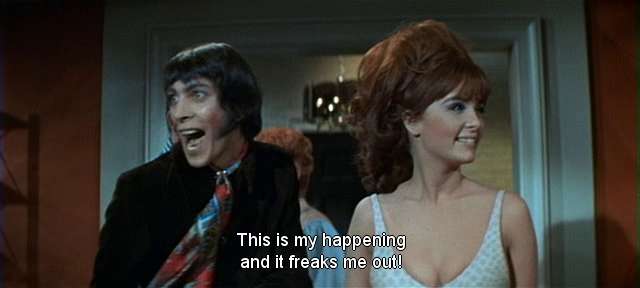Beyond the Valley of the Dolls (1970)
Crimes:
- Having a title that indicates it’s a sequel without actually having anything to do with the original
- Still being rated NC-17 despite being tepid and hardly showing anything gratuitous at all
- Featuring the exact same sort of “hippie party” that had nothing to do with actual hippies as in so many other movies of its era
- Reusing costumes that 1970 audiences might recognize as having originally been worn in the first one by recently-murdered Sharon Tate
- Not bothering to plot the movie before filming started, leading to a literally impossible ending
Defenders: Screenwriter Roger Ebert
Tone of commentary: Casually academic. Ebert was not just a film critic and the screenwriter, he was a historian of film. He was also a personal friend of director Russ Meyer, and they shared an office suite during the making of the movie. Ebert acknowledges freely that the film is generally known for its camp value, but he doesn’t take it any less seriously for all that. He does, admittedly, stop the commentary occasionally for notable lines (especially the infamous “This is my happening and it freaks me out!”), but most of the time, he keeps talking.
Not that this is a bad thing. If you want to know about the making of this movie, Russ Meyer in general, and the state of film in 1970, Ebert’s got you covered. The only thing he seems not to know is whether or not Pam Grier was actually one of the extras. He says he’s never actually managed to spot her for sure, though there’s a woman who might be her. Ebert is, however, full of information about just about everything else. Film angles, reviews, the casting process, the writing process? It’s all there.
What went wrong: By the sound of it, Ebert, at least, got pretty much exactly the movie he expected. There’s some doubt about its success as satire, which is not helped by Ebert’s continual confessions that he didn’t really know much about the people he was supposedly satirizing. The studio didn’t necessarily get what they wanted, but Ebert assures us that this was a time of great confusion in the industry. He even hauls out the classic quote that Twentieth Century Fox had, at the time, “two war movies and a Western”—namely Patton, M*A*S*H, and Butch Cassidy and the Sundance Kid. Beyond seems to have made back about ten times its budget, so that’s none too shabby. Ebert does suggest that it misses its true audience by not being released as a midnight movie.
Comments on the cast: Another probably relevant quote here is one Ebert says was Meyer’s response when asked where he finds the women he cast in his films—Ebert says his response was, “After they reach a certain cup size, they find me.” However, he makes it very clear that the “casting couch” was never in use in a Meyer production, and indeed he says that Meyer didn’t want the actors to have sex on the set. Apparently, on one production, Meyer went around nailing windows in their motel shut.
All in all, Ebert has good things to say about pretty much everyone. He has a fair amount to say about the relative emphasis placed on Marcia McBroom, who plays Petronella Danforth in the movie. Her character arc is, he tells us, the most stable, and they subverted expectations by having the already cliché running-in-slight-slow-motion-through-fields sequence involve the black couple.
Inevitable dash of pretension: Wow, does Ebert think Russ Meyer was like a silent film director. It comes up a bunch. “This is the kind of filming technique, the kind of literal storytelling technique, that you might see in a silent film,” he tells us midway through the film. He also speaks of trying to have a shot that duplicates a scene from Citizen Kane but being unable to afford it.
Commentary in a nutshell: In reference to the Carrie Nations’ changing in their dressing room, “Just a little bit of cheesecake here.”
Note—there is a second commentary track on the disc. The other one features performers Dolly Read, Cynthia Myers, Harrison Page, John La Zar and Erica Gavin. I didn’t listen to it.

